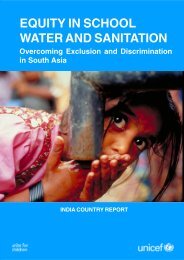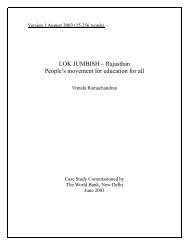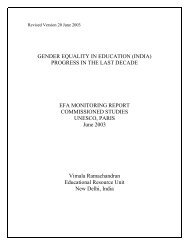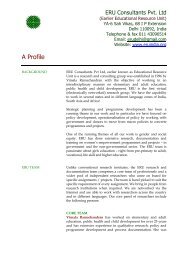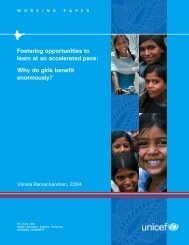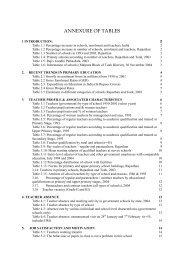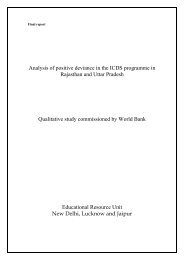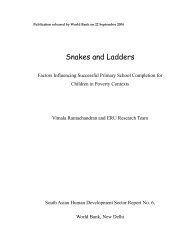primary school teachers the twists and turns of everyday practice
primary school teachers the twists and turns of everyday practice
primary school teachers the twists and turns of everyday practice
You also want an ePaper? Increase the reach of your titles
YUMPU automatically turns print PDFs into web optimized ePapers that Google loves.
Version 20 Oct 08, edited final<br />
communication in Karnataka provides useful lessons (Ramach<strong>and</strong>ran 2006). Well<br />
before <strong>the</strong> programme was rolled out, <strong>the</strong> Azim Premji Foundation (APF) had<br />
already evolved a communication strategy with <strong>the</strong> help <strong>of</strong> pr<strong>of</strong>essionals. From <strong>the</strong><br />
beginning it was recognised that communication was essential to build trust,<br />
especially when working in partnership with <strong>the</strong> government on <strong>the</strong> one h<strong>and</strong> <strong>and</strong><br />
local communities on <strong>the</strong> o<strong>the</strong>r. At <strong>the</strong> same time it was essential to reassure all<br />
stakeholders that participation in LGP was purely voluntary.<br />
As in <strong>the</strong> case <strong>of</strong> <strong>the</strong> LGP programme, <strong>the</strong> strength <strong>of</strong> <strong>the</strong> Pratham initiative in Kutch<br />
(Gujarat) lies in ensuring communication with <strong>and</strong> accountability to <strong>the</strong> community<br />
through sustained dissemination <strong>of</strong> <strong>school</strong> data <strong>and</strong> <strong>the</strong> learning <strong>of</strong> children. The<br />
Dhan Patrak (<strong>the</strong> educational pr<strong>of</strong>ile <strong>of</strong> individual children) is a powerful tool that<br />
enables parents to track <strong>the</strong> progress <strong>of</strong> <strong>the</strong>ir children. It is interesting that child<br />
pr<strong>of</strong>iles are now developed by many programmes <strong>and</strong> computerised child tracking<br />
mechanisms are much sought after; but <strong>the</strong> important issue is how <strong>the</strong>se are<br />
positioned in <strong>the</strong> larger monitoring system <strong>and</strong> how <strong>the</strong>y engage <strong>and</strong> support<br />
<strong>teachers</strong> <strong>and</strong> communities to bring about change. What <strong>the</strong> Pratham Gujarat<br />
experience shows is that information on individual children can become a powerful<br />
tool in <strong>the</strong> h<strong>and</strong>s <strong>of</strong> <strong>the</strong> parents <strong>and</strong> <strong>the</strong> larger community as represented by <strong>the</strong><br />
Shiksha Gram Sabha, <strong>the</strong>reby sending a clear message <strong>of</strong> what is expected.<br />
Three, energising <strong>the</strong> <strong>school</strong> system by supporting <strong>the</strong> teacher to improve classroom <strong>practice</strong><br />
<strong>and</strong> assessment processes. The ability <strong>of</strong> a teacher to teach creatively <strong>and</strong> make <strong>the</strong><br />
classroom child-friendly is not only about teaching-learning materials <strong>and</strong> textbooks.<br />
It is inextricably linked to how <strong>the</strong> teacher is treated in <strong>the</strong> system, <strong>the</strong> autonomy she<br />
enjoys <strong>and</strong> her sense <strong>of</strong> accountability to children <strong>and</strong> parents. An important<br />
criticism <strong>of</strong> initiatives like DPEP is that <strong>the</strong>se strategies were implemented in a selflimiting<br />
modular fashion. For example, teacher-training is not always linked to<br />
textbook development. The various dimensions <strong>of</strong> quality are rarely woven toge<strong>the</strong>r.<br />
Treating each ‘input’ as a self-contained unit <strong>and</strong> not seeing <strong>the</strong> entire education<br />
process as an organic whole is a big h<strong>and</strong>icap. Working with <strong>the</strong> teacher as <strong>the</strong><br />
cornerstone in <strong>the</strong> process <strong>of</strong> change dem<strong>and</strong>s going beyond formal training <strong>and</strong><br />
materials production—it starts with efforts to kindle self-motivation <strong>and</strong> enthusiasm<br />
<strong>of</strong> <strong>the</strong> <strong>teachers</strong> by appealing to <strong>the</strong>ir creativity <strong>and</strong> desire for satisfaction in <strong>the</strong>ir<br />
work.<br />
QIP, a precursor to CLIP in Andhra Pradesh, used <strong>the</strong> accelerated learning method<br />
similar to <strong>the</strong> ‘Learning to Read’ programme <strong>of</strong> <strong>the</strong> Pratham Education Initiative,<br />
whereby a time-bound 45-day programme was introduced to enable children to<br />
learn to read <strong>and</strong> acquire basic numeracy <strong>and</strong> arithmetic competencies (Patni 2006).<br />
The drawbacks <strong>of</strong> this approach were soon evident. As <strong>the</strong> State Project Director,<br />
SSA explained, ‘There was no visible change in <strong>the</strong> mindset <strong>of</strong> <strong>the</strong> <strong>teachers</strong> after <strong>the</strong><br />
45-day period <strong>of</strong> intervention. Fur<strong>the</strong>r, it was also back to normal business for<br />
everyone in <strong>the</strong> system as soon as <strong>the</strong> 46th day dawned! What was required was a<br />
seamless <strong>and</strong> continuous intervention during <strong>the</strong> academic session.’ CLIP moved<br />
away from a time-bound mode to one where <strong>the</strong> <strong>teachers</strong> were expected to use <strong>the</strong><br />
techniques <strong>the</strong>y had learnt in QIP all year round. This was backed by a rigorous<br />
monitoring system wherein all supervisory <strong>and</strong> academic support institutions were<br />
expected to visit <strong>school</strong>s continuously to monitor what was happening in <strong>the</strong><br />
classroom. The important lesson from this initiative is that pedagogic creativity does<br />
not lead to appreciable change unless it is backed by systemic efforts to monitor<br />
learning ra<strong>the</strong>r than merely generating data on enrolment <strong>and</strong> transition.<br />
21



